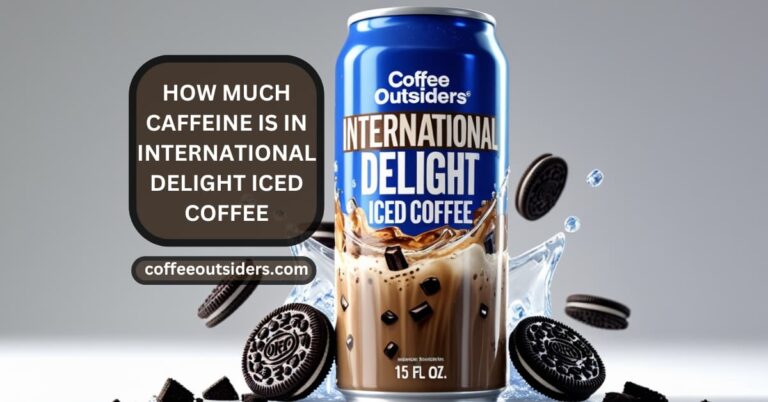Why Do People Drink Decaf Coffee? My Insights
For those who can’t drink regular coffee, decaf provides the experience of having a delicious cup of coffee, from the aroma to the flavor, without caffeine’s jitters or jitters.
Decaf coffee is a popular choice for those who want to reduce their caffeine consumption but continue enjoying their preferred drink. It’s a great choice for anyone who is sensitive to caffeine or wants something a little less intense during the day.
Recent methods of decaffeination have made it more flavorful than ever. In the end, it’s complex and indulgent, which is why it is loved by coffee drinkers across the globe.
- Decaffeinated coffee is made from coffee beans that have had 97% or more of the caffeine removed. Each cup typically has just 3-7 milligrams of caffeine. Decaf coffee still keeps the great taste of regular coffee, just with less intensity.
- Decaffeination methods such as the Swiss water process remove almost all caffeine from the beans. They remove flavor and aroma, too, leaving decaf a wonderful option for caffeine-intolerant coffee lovers.
- Decaf coffee mitigates caffeine sensitivity and lowers anxiety levels. It’s better for sleep too, meaning you can drink coffee at night without ruining your sleep.
- Pregnant women, those with acid reflux, and anyone looking to cut back on heartburn will love drinking decaf. It really fits in with their health needs and their dietary purpose.
- Decaf coffee improves health due to its antioxidant compounds. It can help increase sexual wellness, cardiovascular health, and is gentler on the digestive tract, making it a wonderful healthy decaf coffee alternative.
- Recent improvements in decaffeination processes have made decaf coffee much more flavorful and aromatic, so don’t rule it out! These days, coffee fans are treated to a greater selection of flavorful choices.
What Is Decaf Coffee
Decaf coffee is an extremely popular drink, produced from coffee beans that are almost completely caffeine-free. It’s not entirely free of caffeine. Decaf coffee isn’t completely caffeine-free, but it typically has just 2-6 milligrams of caffeine per cup compared to 80-180 milligrams for regular coffee. This indicates that about 97% of the caffeine is eliminated in processing.
For many people, decaf offers a way to enjoy the familiar, comforting taste of coffee without the stimulating effects of high caffeine levels. It’s a perfect option for all those who are caffeine sensitive. If you’re looking to cut back for health reasons or just want to drink coffee later in the day without affecting your sleep, this choice is ideal.

Decaffeination opens the world of coffee to many others by catering to diverse needs and preferences. For others, jitters and insomnia can occur after just one regular cup of coffee. Some people start to feel palpitations or an elevated heart rate. For these individuals, decaf offers an opportunity to continue savoring coffee’s robust flavors and aromas.
Decaf is an excellent solution for those wanting to reduce their caffeine consumption. It lets you keep drinking coffee the way you like, but without the jitters! The general recommendation for caffeine intake for the average adult is no more than 300 milligrams per day. Decaf coffee is perfectly in line with this recommendation, adding a pint-sized drip of caffeine.
Definition of Decaf Coffee
Decaf coffee, even though it’s lower in caffeine, still keeps a lot of the great flavor found in regular coffee. With so many options available, decaf coffee can be a perfect fit for everyone. It can be made with Arabica beans for a smooth, mild taste or Robusta beans for a bolder, more robust flavor.
For consumers looking for a comforting and familiar coffee experience, decaf provides a milder option that still delivers rich flavor. It’s super accessible – available at almost every grocery store and coffee shop, which helps to make it an easy addition to everyday life.
Decaf coffee makes a fabulous low-calorie beverage at only 2 calories per 8-ounce cup. In comparison, regular coffee can be upwards of 95 calories, depending on how it’s made.
How Decaffeination Works
Caffeine removal from coffee beans happens through a couple different processes. The carbon dioxide method involves using compressed CO₂ to extract caffeine from the beans, all while maintaining the beans’ natural flavors.
The Swiss water method provides a chemical-free decaffeination process. It uses water and the power of filtration to gently remove caffeine from coffee. Coffee enthusiasts love this method because it retains the coffee’s pure flavor profile and aroma.
It rejuvenates the coffee experience by preserving the coffee’s lively flavors. While decaffeination does alter the flavor somewhat, you’ll still enjoy a delicious cup of coffee. It still keeps its unique richness and aroma for you to savor.
Caffeine Content in Decaf Coffee
Decaf coffee contains significantly less caffeine than its caffeinated counterpart. This makes it a perfect option for those who want to reduce their caffeine intake. Regular decaf coffee is around 97% caffeine-free with caffeine content around 2-6mg/cup.
If you are sensitive to caffeine, even trace amounts can lead to negative side effects. Others may require an intake of less than 40 milligrams of caffeine a day to prevent unpleasant symptoms.
Decaf coffee allows you to enjoy the full-bodied coffee indulgence without the excessive jitters. It’s the ideal solution for coffee lovers who want to put their health and wellness first.
Reasons People Choose Decaf
Decaf coffee attracts a broad spectrum of people for many reasons, and it isn’t solely because they want to avoid caffeine. There are plenty of others who love the taste, aroma, and soothing warmth of coffee — just not the perky pick-me-up of regular coffees. Decaf offers an opportunity to enjoy the full coffee experience while catering to personal health or lifestyle goals.
1. Managing Caffeine Sensitivity
For anyone with a low tolerance to caffeine, decaf coffee is the tried-and-true answer. For some, regular coffee is just too intense. Caffeine sensitivity is a common occurrence that results in negative side effects such as restlessness, racing heartbeat, or upset stomachs.
Decaf provides a solution to get the flavor of coffee without these hurdles. Finding new decaf favorites can be a fun adventure. With so many blends and roasts—including decaf blends that are light and fruity or bold and rich—there’s something for every palate.
Knowing your personal caffeine tolerance will help you figure out which brew to go with. This allows you to drive what’s most effective for you, whether that’s decaf or otherwise.
2. Reducing Anxiety and Jitters
Caffeine may increase anxiety or give you the jitters. Decaf coffee gives a relaxing and satisfying option for those who want to avoid them. The ritual of drinking a warm mug will remain cozy and habitual, even sans caffeine high.

Whether you’re feeling stressed or anxious, decaf can help you unwind in a subtle, soothing way. It allows coffee enthusiasts to consume their beloved beverage without any extra worry.
This makes it a wonderful companion for all of life’s quiet moments.
3. Improving Sleep Quality
Decaf coffee is particularly the star of this show when it comes to alternative coffee options for evenings or late-night coffee dates. Regular coffee, with its higher caffeine content, can disrupt sleep cycles.
Decaf—with just 2 to 6 milligrams of caffeine per cup—avoids this problem. Enjoying decaf as part of a nighttime routine can help signal your body that it’s time to wind down.
Pairing it with a soothing activity, such as reading or listening to music, deepens its calming effect. That unique blend makes it the perfect way to relax and decompress after a hectic day.
4. Enjoying Coffee at Night
So decaf coffee provides night owls and coffee lovers the opportunity to kick back and savor a scrumptious cup just before bed. It provides the complete coffee experience without the jitters!
You can froth milk to make rich lattes and mochas, or brew delicious black coffee. You’ll be safe from your after hours activities keeping you up past your bedtime!
This is what makes decaf the ideal solution for those who want to savor coffee’s deep flavors and comforting warmth without jeopardizing a good night’s sleep.
5. Supporting Pregnancy Needs
Expectant mothers usually have to cut back on their caffeine consumption, and decaf coffee provides a soothing option. With minimal caffeine, expectant mothers can safely enjoy their favorite brews—up to two cups a day—without worrying about potential health effects.
This option gives them the ability to remain linked to their coffee traditions while making healthy choices for themselves and their baby. The ritual of drinking coffee can serve as an emotional pick-me-up during this life stage.
6. Reducing Heartburn Symptoms
Heartburn or acid reflux can keep some people away from regular coffee because it’s acidic. Decaf provides a milder alternative, featuring reduced acidity that can help alleviate digestive issues.
For those of us who are sensitive to heartburn, decaf can help you rediscover the joy of coffee. It’s a simple, low-cost change that greatly improves their daily comfort.
7. Maintaining Lower Cholesterol Levels
Research has indicated that decaf coffee can contribute to heart health by promoting healthy cholesterol levels. The antioxidants found in decaf are a big part of this benefit, making decaf an important part of a heart-friendly diet.
Enjoying two to three cups of unsweetened or milk-based decaf coffee per day can play an important role in your health and wellness. It’s a wise decision, particularly if you’re committed to protecting your cardiovascular health.
8. Aligning with Health Goals
Decaf coffee is an easy addition to anyone’s health-conscious lifestyle. If you’re working with other dietary restrictions, decaf is an excellent option. It’s a great fit for consumers who are more wellness-oriented or who want a lower-caffeine choice.
Its compatibility with a variety of diets, including low-acid, low-caffeine or caffeine-sensitive plans, makes it a versatile, accommodating option. In addition to lower levels of anxiety and stomach discomfort, drinking decaf lowers risk of type 2 diabetes and a number of neurological disorders.
This decaf perk only adds to its surging popularity.
Health Benefits of Decaf Coffee
From cardiovascular health to decreased cancer risk, the health benefits of decaf coffee are numerous, making it a great option for everyone. Though regular coffee tends to receive all the attention, decaf coffee emerges as a milder option with distinctive, health-promoting features.

It offers the perfect solution to savor the rich, comforting taste of coffee that fans love—and help them feel their very best. It’s loaded with antioxidants. It can protect against the development of chronic disease, making decaf a perfect complement to a nutritious diet and an overall healthy lifestyle.
Antioxidant Properties in Decaf
Like regular coffee, decaf coffee is high in antioxidants, compounds that protect your body from oxidative stress. Oxidative stress is an imbalance between free radicals and antioxidants, resulting in cell damage. This type of damage is implicated in aging and numerous chronic diseases.
The antioxidants in decaf coffee, like chlorogenic acid, work to counteract these effects by neutralizing free radicals. For example, decaf consumption can revitalize skin and slow signs of aging with prolonged use. These antioxidants work to decrease inflammation.
This is huge since inflammation is at the root of most health problems, including arthritis and heart disease. Making decaf a part of your daily life allows you to experience its protective effects. In addition, you can avoid the jittery feelings from caffeine. For coffee drinkers interested in finding that perfect balance, decaf offers a smart choice with real benefits
Lower Risk of Heart Disease
Studies have indicated that drinking decaf coffee can reduce the likelihood of developing heart disease. Compounds in decaf, like lignans and magnesium, are known to promote cardiovascular health. These compounds increase circulation and can lower cholesterol.
A cup of decaf coffee, enjoyed in moderation, fits into a heart-healthy dietary pattern. Research has indicated that moderate coffee intake, decaf included, is linked to a lower risk of heart disease and stroke. For instance, decaf coffee can preserve the lining of blood vessels, stopping conditions such as atherosclerosis from developing.
By switching to decaf, people can still reap these rewards. They can sidestep complications from caffeine, like an increased heart rate or palpitations.
Better Digestive Health
For anyone who experiences a queasy stomach from caffeine, decaf coffee provides a soothing substitute. Regular coffee’s high acidity can irritate the GI tract, but decaf coffee’s lower acidity makes it gentler on the stomach. This makes it less likely to induce heartburn or upset stomachs.
Decaf can improve gut health by encouraging a healthy bacterial ecosystem. This balance is essential for digestion and whole-body health. Additionally, decaf’s nutrition mix provides a useful infusion of magnesium and potassium, both of which help promote healthy digestion.
By lowering the risk of gastrointestinal disturbances, decaf can allow people to savor coffee without sacrificing their comfort.
Reduced Risk of Nervousness
Perhaps the greatest health benefit of decaf coffee is its power to reduce jitters. Containing just 2-6 milligrams of caffeine per cup, decaf greatly lowers the chance of caffeine-related anxiety or jitters. This makes it a wonderful option for those who are sensitive to caffeine or easily become jittery.
With lower caffeine levels, decaf coffee promotes a calmer state of mind. This overall reduction in caffeine plays a role in better sleep quality. Sleep deprivation can exacerbate symptoms of anxiety and depression, and decaf provides a way to enjoy coffee without disturbing sleep patterns.
A meta-analysis completed in early 2023 found that decaf coffee reduces the risk of anxiety and depression. This makes it a soothing option for anyone in search of mood-boosting benefits.
Myths About Decaf Coffee
Does Decaf Contain No Caffeine
The biggest myth about decaf coffee is that it’s 100 percent caffeine-free. This is not totally accurate. Myth #3 decaf coffee has no caffeine. Decaf coffee does have its caffeine content reduced substantially.
To comply with legal standards, decaf must be at least 97% caffeine-free. An average cup of decaf contains only 5 to 10 mg caffeine. By comparison, an 8-ounce cup of regular coffee contains about 95 milligrams. While this difference might be petty to some, it’s a big deal for most.
Decaf is then a wonderful alternative for people who want to reduce their caffeine intake but don’t want to give up the flavor of coffee. This myth is often perpetuated which can create misinformation for coffee consumers seeking to make the best choices possible.
People with a high sensitivity to caffeine might think that decaf coffee would pose no risk at all. They can still experience mild effects from the small amount of caffeine it has. Making it easier for consumers to understand the true caffeine content will allow them to better align their taste and lifestyle with their choices.
Misconceptions About Flavor Strength
The second myth is that decaf coffee is tasteless and a watered-down version of regular coffee. Maybe this was the case decades ago when early decaffeination processes did occasionally rob coffee of its rich, natural flavors.
Modern approaches have come a long way. Nowadays, great decaf options keep all that rich, exciting flavor and character coffee has to offer. Peet’s Decaf House Blend is made with the same top-quality beans as their regular House Blend.
This results in a smooth and balanced flavor profile from cup to cup. My husband is a die-hard coffee lover. Once he got such an intense flavor that he declared this decaf coffee was better than nearly all caffeinated coffees he’s ever sampled.
Peet’s and Kunjani use only the highest quality Arabica beans in their regular and decaf coffees. This meticulous selection process really improves the overall flavor quality. I’ve been a big fan of Peet’s Sumatra decaf for years, and its deep, rich flavor is always a winner.
If you’re an avid coffee drinker who believes decaf doesn’t bring the punch, consider giving a decently-sourced batch a shot. Either way, we guarantee it will change your mind!
Myths About Health Effects
There are some misconceptions about health related to decaf coffee, too. Others are concerned that the decaffeination process will remove coffee’s health benefits or add in unhealthy chemicals.
The myth continues to percolate that decaf is somehow unhealthy when, in fact, scientific research proves that decaf is just as good for you. Research indicates that both regular and decaf can reduce the chance of developing type II diabetes.
They might help lower the risk of getting Parkinson’s disease and Alzheimer’s disease. Today, state-of-the-art decaffeination methods, like the Swiss Water Process, are chemical-free and aimed at retaining features of the coffee’s natural chemical structure.
As long as you stay with a reputable, high-quality brand, you can rest assured knowing you’re sipping on a pure, healthful cup of decaf. It’s a matter of creating a trust-based economy and data-driven decision making.
Improvements in Decaf Coffee

Advanced Decaffeination Techniques
The quality of decaf coffee has really improved over the years, and that’s due in part to the incredible innovations in decaffeination. Of these, one of the more impressive decaffeination techniques is the Swiss Water Process. This chemical-free approach employs just water, temperature and time to gently remove caffeine while retaining coffee’s natural flavors.
This technique helps to preserve the coffee’s natural flavor profile, something that the older decaffeination methods tended to strip away. Another such advancement is supercritical carbon dioxide decaffeination. It employs pressurized carbon dioxide to extract only the caffeine without losing the aroma and flavor that makes the coffee beans so great.
Technology has been a big factor in helping to perfect these processes. Advanced filtration systems and extraction methods make for some of the best coffee around. The result is that decaf tastes a whole lot more like its caffeinated brother.
Thanks to these improvements in decaf coffee, coffee lovers can finally enjoy a great cup of decaf. They’ll no longer need to settle for anything less than the deep flavors and relaxing aroma they desire. Thanks to these innovations, decaf is no longer a compromise. Today, you can enjoy a top-notch brew that’s tailor made to suit your needs.
Enhanced Taste and Aroma
Today’s decaf coffee is a far cry from that awful experience. The new decaffeination methods have definitely made a difference in the flavor and aroma. Convenient to have around, now, you’d never know it was decaf in blind taste tests!
As a result, many brands have begun focusing on premium beans and new roasting methods. This is to make sure that their decaf products have all the same deep flavor and wonderful aroma as their caffeinated counterparts. These improvements open up a much more enjoyable coffee experience for anyone looking to reduce or eliminate caffeine consumption.
The decaf options available today are a fantastic improvement and a lot of fun. Enjoy the full flavor of a medium roast with caramel notes or treat yourself to a dark roast with a sweet, chocolatey finish. Try different brands and blends until you discover your perfect cup of decaf coffee.
You may even discover your ideal, whether you need a rich espresso pull or a mellow cold brew! This wide variety means there’s something for everyone, regardless of their flavor preference.
Wider Availability of Options
There’s never been a better time to explore decaf coffee, with options to fit any taste and lifestyle. Today consumers can get decaf in just about any format. Whether you prefer whole beans, ground coffee, single-serve pods, or instant, we’ve got you covered.
Flavored decafs such as vanilla and hazelnut provide adventurous choices. They make every day coffee routines more interesting for those who want it. Through it all, coffee shops have continued to meet the challenge of a steep increase in demand.
Today, most have decaf versions of all the most popular drinks, including cappuccinos, lattes, and iced coffees. With convenience as a top priority, decaf is more enjoyable than ever. Whether you’re brewing at home or ordering a cup on the run, it’s never been easier!
Your hometown grocery stores or local specialty coffee shops are great places to find interesting new blends and flavors. That means you’ll have no trouble finding a great decaf to suit your individual tastes and dietary requirements!
Who Should Consider Decaf Coffee
Decaf coffee is far from being a one-note beverage, it’s just as well-rounded as the average drinker and perfect for so many people. Decaf coffee lets you enjoy all the robust flavors of your favorite coffee without the jitters and other negative effects of caffeine. It’s a smart option for anyone health- or lifestyle- or preference-minded. Here’s who stands to gain the most from drinking decaf instead.
People Sensitive to Caffeine
For others, even a little caffeine is too much and throws off their entire day. It can lead to jitters, stomach upset, or racing thoughts, making enjoying regular coffee difficult. If you’re someone who’s sensitive to caffeine, decaf offers a perfect solution.
It has very little caffeine, usually 2 to 5 milligrams per cup. Regular coffee, by comparison, contains 80 to 100 milligrams of caffeine. This lets you enjoy the rich flavor and aroma of coffee while skipping all the jittery, anxious, gross stuff.
Anyone with medical conditions that make caffeine a hazard should consider switching to decaf coffee. Those who are controlling anxiety, or working on high blood pressure issues, usually benefit from avoiding any stimulants. Caffeine, especially, is one stimulant they should avoid like the plague.
Listening to your body’s signals is important, and decaf provides an option to enjoy coffee without exceeding your threshold.
Individuals with Sleep Issues
For anyone who has difficulty falling asleep or staying asleep, caffeine can be a significant hindrance. Consuming coffee in the late afternoon or evening can affect your sleep cycles. In turn, this can leave you feeling restless as you lay in bed at night.
Decaf coffee provides a lovely, calming addition to your nighttime routine. Most importantly, enjoy sipping on something warm to calm your mind and body at the end of the day!
If you switch to decaf or no caffeine after the late afternoon, you’re more likely have a good night’s sleep. Replacing your regular coffee entirely makes an even bigger difference.
Sipping on a mug of decaf post-dinner adds a nice cozy routine to your nighttime. It’s a great way to enjoy the delicious flavors of coffee without the kick of caffeine. It’s a simple step for keeping the evening calm and helping to ensure restful sleep in the long run.
Pregnant Women and Nursing Mothers
Pregnant women, nursing mothers and those trying to conceive are advised to avoid excessive caffeine. Excessive amounts of caffeine can enter the placenta or breast milk, posing harmful effects to the baby. Decaf coffee presents a better alternative for caffeine-conscious consumers.
It allows them to enjoy the full-bodied flavor and cozy ritual of coffee without exceeding guideline daily amounts. For pregnant women, it’s recommended to keep these under about two cups (decaf coffee) per day.
This usually amounts to fewer than 10 milligrams of caffeine. This balanced lifestyle means you can still enjoy a ritual you love without sweating the caffeine count. It’s just a matter of balancing out to make sure that both mom and baby stay healthy.
Those Managing Acid Reflux
Caffeine may cause acid reflux or aggravate GERD (gastroesophageal reflux disease) in some people. For individuals struggling with anxiety, insomnia, or digestive problems, traditional coffee might not be the ideal option. Decaf coffee, however, can provide a softer bridge.
Because decaf has much less caffeine, it is less likely to aggravate the esophagus or raise stomach acidity. This makes decaf coffee a great choice for people looking to experience the benefits of coffee without the side effects.
So you can enjoy your morning cup or evening treat with decaf coffee! It helps you appreciate the taste without bringing a fiery storm to your tummy.
Conclusion
Decaf coffee earns its place in the coffee kingdom. It’s a fantastic choice for those who still want to enjoy the great taste of coffee with all the great flavor and none of the caffeine kick. It’s not only about avoiding the jitters, it’s about more options – more variety. From enhancing rest to calming jittery tummies, decaf delivers on genuine benefits. Here are just a few of the myths that don’t stand the test of truth when it comes to decaf. Thanks to modern methods, decaf tastes more like regular coffee than ever before. Whether you’re reducing your caffeine intake or simply interested in trying something new, decaf deserves a place at the table.
If you think you’re up for it, take baby steps with your go-to roast, just in decaf. You may be pleasantly surprised at how good it tastes!
Frequently Asked Questions
Decaf coffee is simply coffee with most of its caffeine content removed. That’s because the decaffeination process usually takes out about 97% of the caffeine, so it’s a much milder choice than regular coffee.
There are numerous reasons why people drink decaf. Some people want to experience the side effects of caffeine, while others control health problems, or simply love the flavor of coffee without the buzz.
Yes, decaf coffee is full of antioxidants and other nutrients that help promote heart health and lower inflammation in the body, too. It’s similarly an excellent choice for people who want to cut back on caffeine for health reasons.
Is decaf coffee completely caffeine-free? A standard 8-ounce cup contains just 2 to 5 milligrams of caffeine. Compared to its caffeinated counterpart, regular coffee comes in hot with about 95 milligrams!
No, one of the greatest myths about decaf coffee is that it is chemically hazardous. Today’s modern decaffeination methods, such as the Swiss Water Process, guarantee safety while enhancing coffee’s natural flavors.
Decaf coffee is ideal for people who are sensitive to caffeine. It’s equally an excellent option for pregnant women or those looking to reduce caffeine intake but still enjoy robust coffee flavor and aroma.
Fortunately, advancements in decaffeination techniques have drastically improved the taste and quality of decaf coffee. Well, now it pretty much just tastes like regular coffee.







